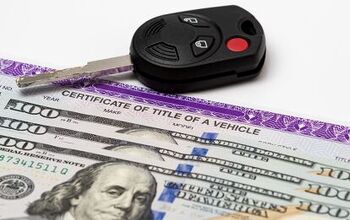As Interest Rates and New Vehicle Prices Rise, Loan Terms and Payments Reach for the Sky

Image, for a moment, that the trailer pictured above is filled with debt. It’s a good representation of the average new vehicle purchase.
Looking at last month’s stats, you’d have to go back to the safe and comfortable pre-Twitter era to find a January in which fewer people got their hands on a zero percent new vehicle loan. January 2006, to be exact.
Last month wasn’t just a departure from a decade past — the car buying landscape appeared quite different just a year ago, all thanks to rising interest rates and the perpetual upward creep of new car pricing. Data from Edmunds helps break down the differences.
Suffice it to say you’re likely paying a lot more, but you’re spreading it out over a longer term.
Last month, the average new vehicle buyer borrowed $31,707 and financed the vehicle over an average term of 69.1 months. That’s up from 61 months in 2010, and 68 months a year ago.
While a longer term helps get buyers into the vehicle of their dreams, it widens the siphon on their bank account, especially considering the average APR in January — 6.19 percent — was up 1.2 percentage points over last January’s average (4.9 percent). Your average American financed their new car purchase with payments of $551 last month.
Average down payment? $4,191.
As mentioned already, finding a low-interest loan has become more difficult than sourcing a compatible mate online. Only 3 percent of new car buyers secured a zero-percenter in January. It wasn’t all that long ago, explains Edmunds Executive Director of Industry Analysis Jessica Caldwell, that more than one in five Americans could walk away with a zero percent loan. The highest concentration of said loans (22 percent) took place in March 2010, she tweeted.
On the higher end, the number of Americans agreeing to loans of more than 10 percent is on the rise, with 12.3 percent of new-car buyers taking on a double-digit APR in January. That’s up sharply from 9.5 percent of buyers just a year ago.
It’s no wonder why we’re seeing buyers flood the used vehicle market — and why certain segments of that market (mainly, small cars) are rising steeply in value. (It’s also no wonder why American auto loan debt has swelled to nearly $1.3 trillion.) The average monthly loan payment for a used car was $407 last month, Edmunds data shows.
[Source: CNBC] [Image: Fiat Chrysler Automobiles]

More by Steph Willems
Latest Car Reviews
Read moreLatest Product Reviews
Read moreRecent Comments
- Jeanbaptiste I know this will never be seen, but the real answer is NO Government mandated tech. The reason why is that when the government mandates something, we miss out on signals that the free market will give to weather or not people actually want this or that this tech would actually help. It's like mandating AM radio for cars when people could just buy a $10 am radio if they really like am so much.
- 28-Cars-Later $12K? I needed a good laugh.
- EBFlex Wait...the feds are claiming that inflation was not FJBs fault 6 months prior to an election where he is massively losing in the polls in every single category?Eyebrow raised.
- MaintenanceCosts Most of the article after the blockquote is Posky laboring mightily to somehow blame this clearly anticompetitive and oligopolistic conduct on the big bad government.I look forward to some of the usual commenters explaining to us that, actually, the oil industry is a cuddly teddy bear and the real villain is people trying to sell us cars that don't use oil.
- Bd2 A modest price bump for one of the better if not the best vehicle in it's class. And it's a very good deal still considering the Front wheel drive competition over at Lexus to name one. These Genesis vehicles are more like BMWs of the 90s but with better styling.

































Comments
Join the conversation
I'll use Canadian statistics. The average car in Canada is according to on line research 9.66 years old. There were a grand total of 1.4 vehicles registered in all of Canada that were over 20 years of age. So cars do not last 20 years in Canada, with very statistically rare exceptions. Yes, you can expect a 'new' car to last 10 years. After that??? And what is the cost of maintaining a car that is 10+ years old? And the impact of rust on its structural integrity? Yet I have one vehicle that is now over 9 years old and I hope to keep it running reliably for another 4 to 5 years. It is Krowned annually. However I have another vehicle that is now 13 years old, that we have decided to 'give away'. We were offered at most $500 for it. Despite numerous new or nearly new parts. We decided that the cost of maintaining it, and the fact that we do not 'trust it' for bad weather, long distance trips have made investing any more time or money into it to be a 'waste'. And we have learned what many have said, that the owner is more important than the make or model regarding long term reliability.
Car Loans Singapore is not only composed of veteran loan experts, we’re also avid car enthusiasts. We see ourselves as more than just another financing institution, we’re your partners when it comes to owning your dream car.follow my website //https://carloans.sg/